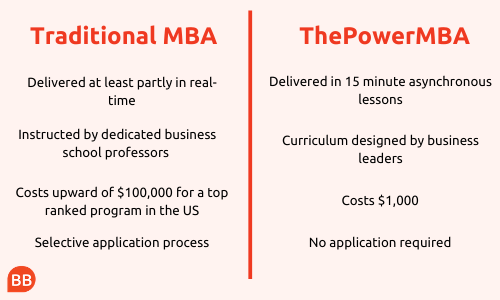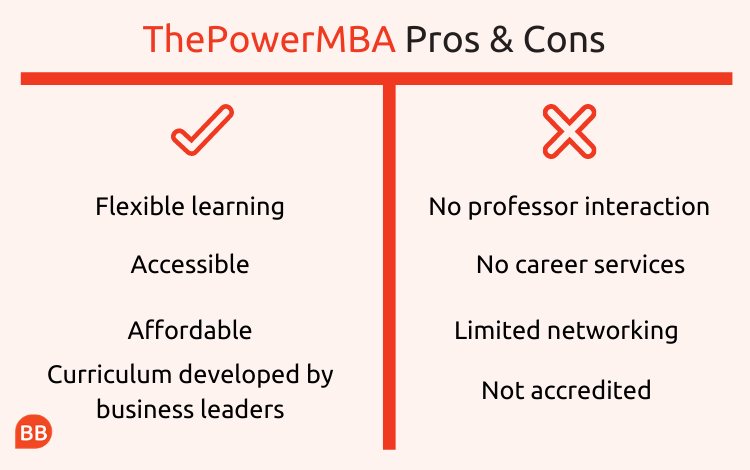ThePowerMBA is an online business qualification, with a curriculum developed by business leaders from companies such as Netflix, Shazam, Waze, and Airbnb.
It can be completed in 15-minute chunks from anywhere, and costs a fraction of the price of a traditional MBA. Unlike typical MBA programs, you can study ThePowerMBA without having to fill out an application. The course is open to anyone who wants to try it.
The program launched around eight years ago, and there are currently 120,000 students and alumni in the program's network, with an overall satisfaction rate of 98%.
Although ThePowerMBA has its advantages, it does not offer the same experience as a more traditional MBA. Below we outline a few important things to know about the program, so you can work out if this business school alternative is the right choice for you.
ThePowerMBA vs a traditional MBA
The main difference between a traditional MBA and ThePowerMBA is the way it’s delivered. Traditional MBAs, whether online or in the classroom, are usually synchronous. This means students can interact with each other and with their instructor in real time.
ThePowerMBA works a little differently—more like a MOOC (massive open online course) than a typical business school program. When students sign up to the program, they are given 15 months of access to an online library of interactive lessons, which are broken down into 15-minute slots and can be studied at your own pace.
This model helps to keep costs down. In fact, undertaking ThePowerMBA costs $999 compared to the $100,000-plus that a highly ranked MBA program in the US would set you back.

Another key difference between ThePowerMBA and its traditional counterparts is that its curriculum is designed by full-time business leaders rather than professors. The program’s pre-recorded classes are delivered by contributors such as The Lean Startup author, Eric Ries, Shazam Co-Founder, Chris Barton, and Girlboss founder, Sophia Amoruso.
Despite the differences between ThePowerMBA and a traditional MBA, the programs do share some similarities. Both feature a broad business curriculum that covers topics including finance and accounting, leadership, strategy, and marketing. On ThePowerMBA students take modules in business model innovation, the lean startup, strategy and business fundamentals, entrepreneurship, and disruptive tech in business.
Both curricula also make heavy use of case studies to help students understand how business concepts play out in the real world. In the case of ThePowerMBA, these case studies often feature the companies founded by the instructor themselves.
The advantages of ThePowerMBA
The main advantage of ThePowerMBA is its accessibility. With its online, anytime delivery, and $999 price point, it is easier to enroll in than a traditional MBA.
Each 15-minute lesson can be delivered to your computer, mobile, or tablet, making it easy to learn wherever you are in the world. This flexible structure means it can be studied alongside a full-time job—although this is also true for plenty of part-time and online MBA programs.
ThePowerMBA has been picked up by more than 600 big name firms including Google, Uber, EY, and Microsoft. The program is aimed at professionals who want to gain a broad introduction to business without sacrificing their full-time position, or committing to a synchronous learning experience.

ThePowerMBA drawbacks
ThePowerMBA offers an accessible learning experience that draws on the insights of real business leaders, but there are certain advantages this teaching model is unable to offer.
Firstly, relying on pre-recorded classes removes the possibility of discussion and debate that, for many students, is the highlight of studying an MBA. Being unable to interact with your instructors also means there’s no opportunity to discuss your individual interests, or receive tailored support.
The program also lacks the career services and personal industry connections offered by a traditional business school.
The fact that ThePowerMBA is not accredited may also pose an issue. Accreditation demonstrates that a school offers a good range of core subjects, taught to an academically rigorous standard.
Without accreditation, ThePowerMBA is unlikely to be recognized in the same way that employers would recognize a traditional qualification.
Other alternative MBAs
If you want to study a non-traditional MBA, there are plenty of other options out there beside The Power MBA. Here are just a few:
The Quantic MBA
Quantic allows access to its comprehensive Online MBA for $950 per month. The Quantic MBA takes 15 months to complete, and can be studied alongside a full-time job.
Virtual classes consist of 150-200 students, and learning is carried out through interactive digital lessons, as well as synchronous discussions and group projects.
Students studying the Quantic MBA also have access to an online library of resources, resume and cover letter consultations, and an online career network. The Quantic MBA is accredited by the Office of the State Superintendent of Education (OSSE), and the Distance Education Accreditation Commission (DEAC).
The Mini MBA
This fast-track version of the MBA condenses two years' worth of content into 40 hours or more of tuition. Mini MBA programs are designed to offer an introduction to business, helping early career professionals gain a footing in business fundamentals, and preparing others for more extensive programs further down the line.
Mini MBAs are offered by business schools including London School of Economics, the University of Buffalo, Miami University, Ohio's Farmer School of Business, and Pepperdine University’s Graziadio Business School.
Most mini MBAs cost between $1,000-$10,000 to complete.

ThePowerMBA offers its students an affordable overview of key business topics, taught by leaders in their field. It could also help you identify where your interests lie if you are considering business school further down the line.
However, it is not a substitute for a more traditional business school program. ThePowerMBA does not allow for the interaction with peers and professors, personal industry connections, networking opportunities, and career services that a traditional MBA would impart.



